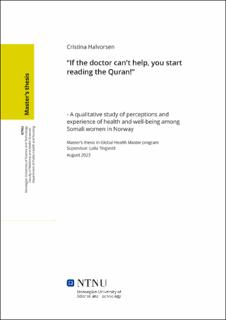| dc.description.abstract | SAMMENDRAG
INTRODUKSJON: Denne masteroppgaven utforsker det tilsynelatende paradokset mellom forskning på helserisiko og substandard levekår for somaliske kvinner som er bosatt i Norge, og deres selvrapporterte evalueringer av personlig helse og velvære. Denne studien undersøker de emiske perspektivene for helse og velvære blant somaliske kvinner bosatt i Norge. Spesielt har studien som mål å utforske innvirkningen av religiøse overbevisninger og kulturelle verdier på deres oppfatninger og opplevelser av helse og velvære.
METODE: Totalt ble det gjennomført seks semistrukturerte dybdeintervjuer med somaliske kvinner bosatt i Norge. Lydopptakene av intervjuene ble transkribert i sin helhet og en tematisk tilnærming ble benyttet for dataanalysen.
RESULTAT: Analysen av intervjuene identifiserte et mangfold av religiøse, relasjonelle og individuelle determinanter som påvirker deres oppfatninger og erfaringer med velvære og helse. Determinantene omfatter religiøs tro, praksis og verdier, sammen med familiære og fellesskapspåvirkninger, i tillegg til individuelle egenskaper som motstandskraft og effekten av en optimistisk tankegang.
DISKUSJON: Deltakernes islamske tro har en dyp innvirkning på deres oppfatning og opplevelse av helse og velvære, og fungerer som et grunnleggende aspekt av deres liv. De somaliske kvinnenes oppfatninger og verdier angående helse og velvære skiller seg fra det sekulære vestlige perspektivet. Denne forskjellen kan bidra til det evidente paradokset mellom forskning på helserisiko og dårlige levekår blant somaliske kvinner og deres egne evalueringer av personlig helse og velvære.
KONKLUSJON: Resultatene av denne studien kan ha praktiske fordeler for beslutningstakere, helsepersonell og utdanningsinstitusjoner. Konkret kan disse funnene bidra til å øke forståelsen av den religiøse og kulturelle konteksten til somaliske kvinner som bor i Norge, noe som kan legge til rette for utvikling av mer skreddersydde helsetjenester. | |
| dc.description.abstract | ABSTRACT
INTRODUCTION: The present thesis explores the apparent paradox between the research on health risk and substandard living conditions of Somali women who are residing in Norway, and their self-reported evaluations of personal health and well-being. This research endeavors to examine the emic perspectives of health and well-being among Somali women residing in Norway. Specifically, the study aims to explore the impact of religious convictions and cultural values on their perceptions and experiences.
METHOD: In total, six semi-structured in-depth interviews were carried out with Somali women residing in Norway. The audio recordings of the interviews were transcribed in their entirety and a thematic approach was utilized for the data analysis.
FINDINGS: The analysis of interviews conducted with participants identified a diverse range of religious, relational, and individual determinants that impact their perceptions and experiences with well-being and health. The determinants encompass religious belief, practices, and values, along with familial and community impacts, in addition to individual qualities of resilience and the impact of an optimistic mindset.
DISCUSSION: The Islamic belief of participants has a profound impact on their perception and experience of health and well-being, serving as a fundamental aspect of their overall life. The Somali women's perceptions and values regarding health and well-being differ from the secular western perspective. This disparity may contribute to the noticeable paradox between the research on health risks and substandard living conditions among Somali women and their own evaluations of personal health and well-being.
CONCLUSION: The results of this study may have practical benefits for policymakers, healthcare professionals, and educational institutions. Specifically, these findings can contribute to enhancing their comprehension of the religious and cultural contexts of Somali women living in Norway, which can facilitate the development of more tailored health support.
KEYWORDS: Somali women, health literacy, spiritual health, well-being, religion, culture, migration | |
